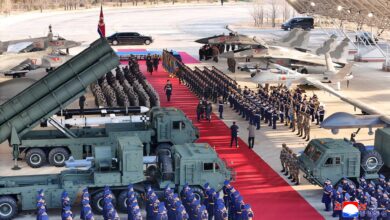It is not long since the Samilpho Specialities Factory has been widely known around the country. Technological innovation that was effected at this factory fanned the flames of a revolution in the foodstuff-processing industry.
It was on April 7, 2009 that Kim Jong Il visited the factory.
Outwardly, it did not look so majestic–a yard surrounded by two-storey buildings for production.
But it boasted a wide product range–bread, noodles, confectionery, oil, liquor, honey, seafood, pickles, traditional tonics, beverage, ceramics, etc.
It depended entirely on locally available raw materials to feed the production lines, introduced advanced technology in processing and packaging, and established cultured practices in production.
He was all smiles looking round the room dedicated to the history of the factory and the shop floor.
He said: It resembles a foodstuff show at the Three-Revolution Exhibition House. All products here have been made in our country. This can be called a spark for a revolution in the foodstuff-processing industry. This is precisely the groundwork for bringing about a revolution in light industry, the foodstuff-processing sector in particular. Today I am happier than on the day when our artificial satellite Kwangmyongsong 2 achieved orbit.
Then he went on to say to the factory officials:
I extend my heartfelt thanks, in the name of the Supreme Commander, to the officials and all other employees of this factory who have rendered a positive contribution to improving the dietary life of our service personnel and people by sprucing up the factory and mass-producing hundreds of kinds of quality goods by themselves in line with the requirements of the Songun era.
Though with some hesitation, the manager requested the General to meet his meritorious employees who had worked at the factory for ten years since its inauguration.
Kim Jong Il said, “I agree with you, manager. Send for all of them.”
After a while he greeted the laudable employees and highly praised them for having worked hard in the revolutionary soldier spirit and the revolutionary spirit of self-reliance and fortitude to bring such huge benefits. Calling them patriots and meritorious workers, he posed for a photograph with them.
Then he moved to a shop attached to the factory and looked carefully at the counters stacked with commodities.
He said that he was very happy to see them and, noticing makkoli (crude liquor–Tr.), asked about the demand for it.
Told that the demand was growing, he said:
We are buying five bottles of this liquor.
Where is the cashier? Pay her money.
“Yes, sir,” answered an official.
Credit sale must not be allowed at a shop.
He said with a stern look and then laughed.
The officials laughed, too. Some minutes ago, while looking round the factory, the General asked the manager what was the best liquor at the factory. The latter replied that it was the one made from songi mushroom of Mt Chilbo. The General advised the officials in his company to buy liquor and other foodstuffs.
Then he emphasized, “And you must pay the price.”
At that time there was nobody among them, who could read his mind. He was conceiving a plan to raise the flames of a revolution in light industry across the country with an example set by this factory as the initial spark.

